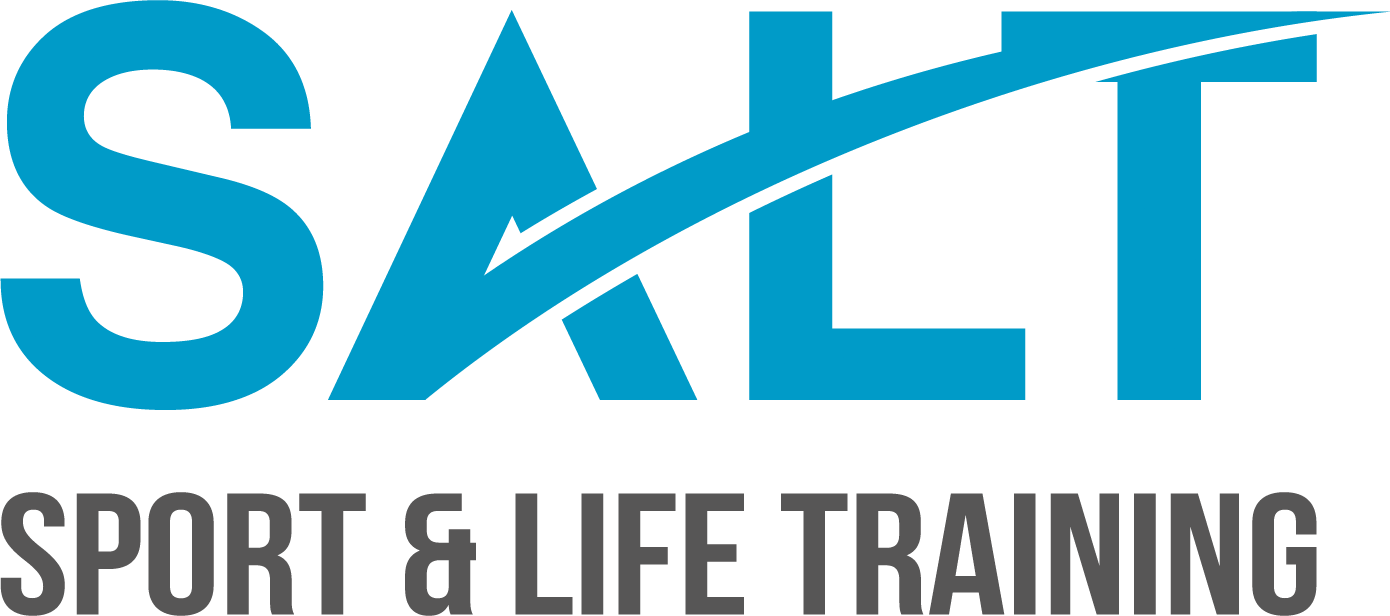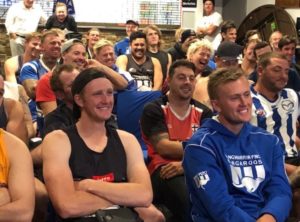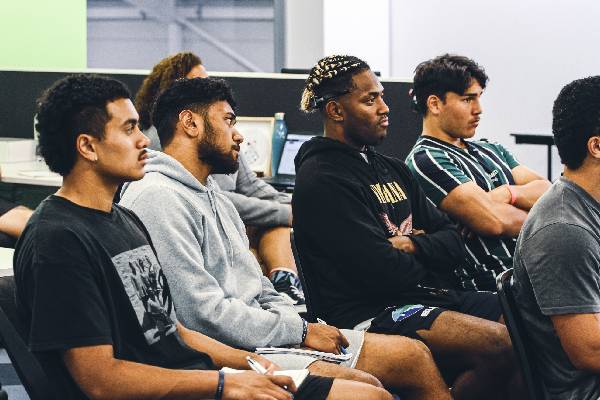
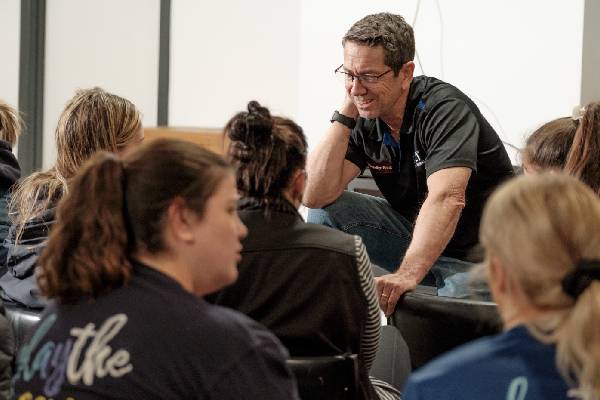
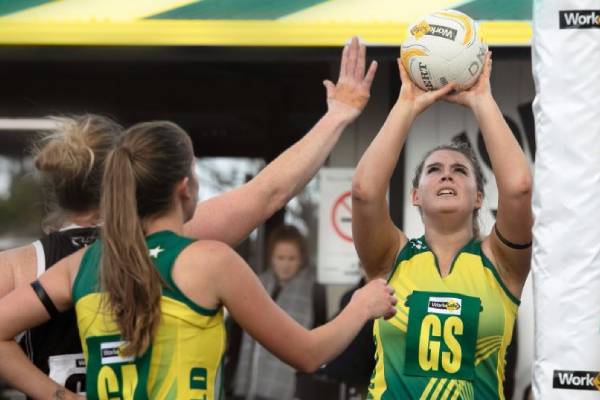
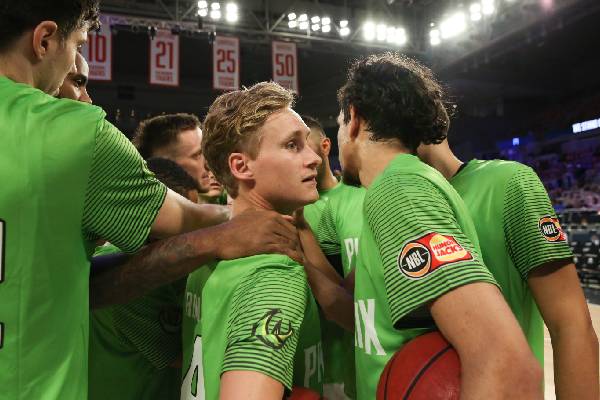
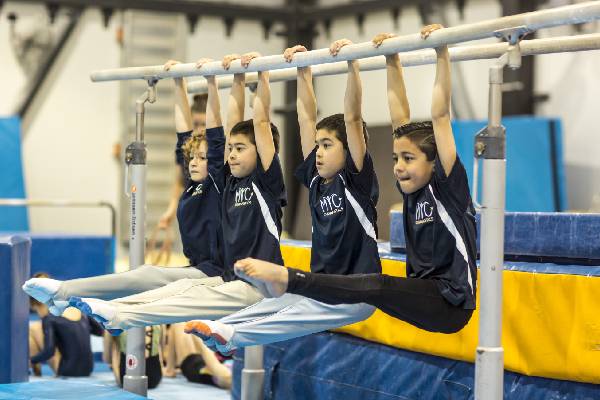
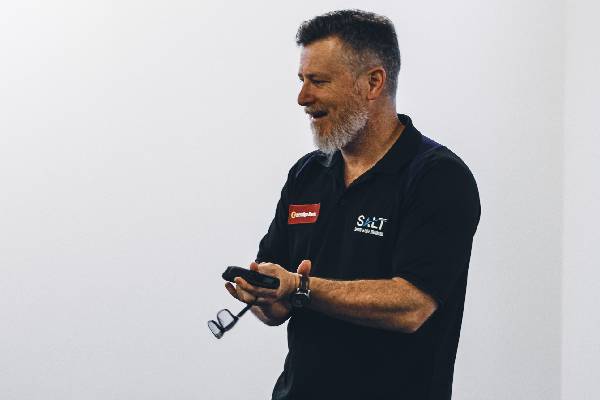
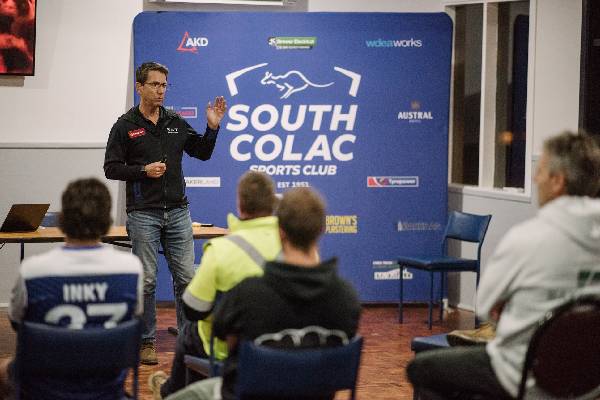
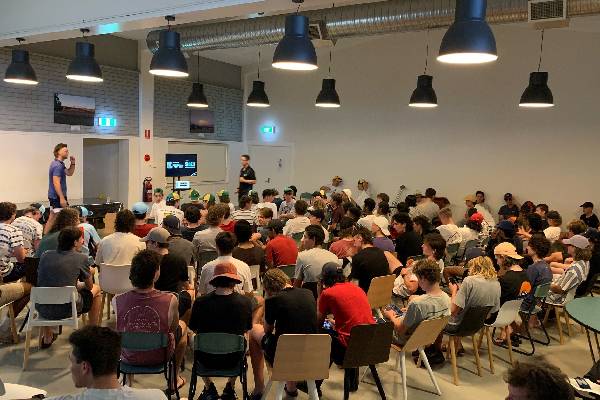
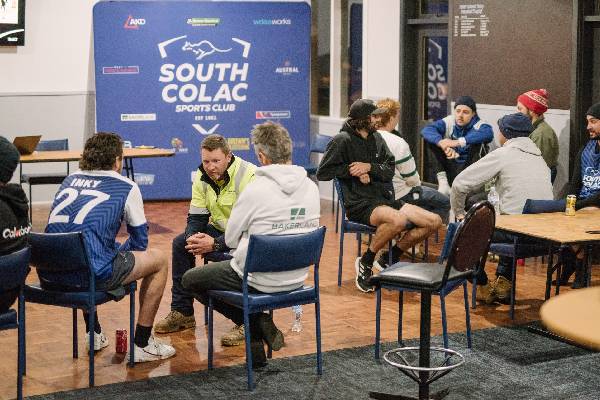
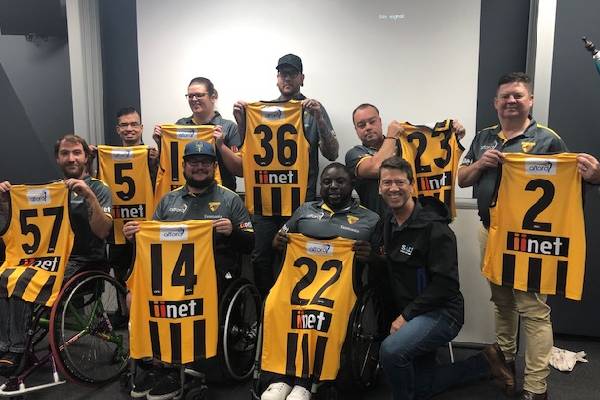
OUR COURSES
SENIOR SESSIONS
WELL-BEING & MENTAL HEALTH
This session is designed to give participants an understanding of anxiety and depression and provide them with positive mental health habits for life. It educates participants about the importance of having ‘real conversations’ and aims to reduce the stigma that remains around mental health issues. Participants are encouraged to ask good questions of their friends and to be open and honest about how they are coping and gain a better understanding of the support structures available.
CLUBS WITH HEART – IN CLUB SESSION FOR WHOLE CLUB COMMUNITY
This session outlines how to create a new ERA in your club through Education, Responsibility, and Accountability. Clubs with Heart aim to be highly competitive, they want to win, and they want to produce great players. However, they understand that they have a higher calling, which is to create a community of care, respect, courage, and resilience. This session focuses on creating a story for which your club is known. We address the barriers that hold us back, then build the knowledge, the structures, the leaders, and the behaviours we need. Finally, we focus on building competitive greatness.
EQUALITY IS THE GAME
This session tackles the issues of gender equality, racial equality, sexual equality (LGBTQIA+), respect, and inclusion. Participants are positively motivated to be part of the solution in creating equality and inclusion, firstly in our sporting clubs and secondly in the wider community.
TEAM FIRST LEADERSHIP – SENIOR CLUB VERSION
This session is designed to allow senior sporting club leaders to examine and determine what kind of club they want to create and how they, as leaders, can drive the change they want to see. Essentially, great clubs are values-driven and leaders are aware of their own strengths, but more importantly, they are looking to identify and develop the strengths of other club members, so that ultimately change is driven by everyone.
ALLIES OF CHANGE – PREVENTING VIOLENCE AGAINST WOMEN (SENIOR MEN)
In conjunction with the Champions of Change course, Allies of Change is aimed specifically at adult men. If our society is to experience a reduction in violence towards women, the change needs to be driven largely by men. This requires men to believe that the cause is vital and that our role as allies is the number one factor that will change the outcomes for women and girls.
This session does not start from a position of blame. It is a positive course that educates, motivates and equips men to take responsibility, to hold each other accountable and to be proactive allies.
CLUB WELL-BEING package
This session is designed for volunteers who have done the well-being and mental health session and want to expand and grow their knowledge and influence in this space within the club. They will be trained online through 3 interactive sessions to become the eyes, ears, and heart of well-being and mental health in the club. The CWT is generally made up of three to six people who are well-known, trusted, wise, and approachable. They are caring and perceptive. They are happy to approach people and have a conversation to see how people are coping.
DRUGS AND ALCOHOL
Traditionally many sporting clubs have relied on alcohol sales to generate club revenue and have sometimes promoted heavy drinking. We also know that heavy alcohol use can lead to illicit drug use. This session explores the dangers of heavy alcohol use and drug abuse. It asks, ‘What kind of club do you want to be?’ ‘What kind of influence do you want to have on the kids coming up?’ ‘What reputation do you
want in the community?’ ‘Where do drugs and alcohol fit into all this?’ and ‘How can we create an environment that supports anyone dealing with a drug or alcohol issue while keeping the club, healthy and drug-free?’
CHAMPIONS OF CHANGE
Some sports have traditionally been male-dominated. Great clubs are recognising the importance of enabling women and girls to access these sports and be treated as equals. This session helps clubs understand why this is so important and handle the transition successfully. Topics covered include the rise and impact of women’s sports, the barriers that exist, examples of ally behaviours around gender equality, and creating a club where all people feel welcomed and respected.
CLUBS WITH HEART – CLUB TRANSFORMATION SERIES.
ONLINE ONLY
This is for a small group of participants from each club who are committed to transformational change. It is 6 online sessions, over six weeks with leaders from other clubs and other sports. This session goes far deeper than the CWH session mentioned above. There are 6 hours of content, tasks to fulfill after each session, expert guests, interconnection, and support between clubs and codes. Typically we will run this session twice a year. For more information visit clubswithheart.com.au.
JUNIOR SESSIONS
PEER GROUP PRESSURE AND DECISION MAKING – STAND YOUR GROUND (MALE 11-14)
This session is designed to help boys at a time when there is significant pressure to experiment with negative risk-taking behaviour and to fit in with their peers. This session provides younger people up to the age of 14 years, with a tool kit to help them respond confidently. Research shows that if young people have rehearsed their responses, they are far more likely to make a positive decision under pressure.
TEAM FIRST LEADERSHIP (MALE AND FEMALE 15-18)
This session is designed to explore how sportspeople can apply the strengths they develop in sports to their life off the field. In sports, everyone leads at times during a game or competition, the same applies in life – at times we are all required to lead. A good leader develops strong relationships, leads by example, demonstrates humility, holds others accountable, and is empowering. This session encourages individuals to recognise their strengths and values and apply them wisely to bring out the best in themselves and
others around them.
EMPOWERED (FEMALE ONLY 15-19)
This session is designed to help girls overcome an often accepted, narrow definition of what it means to be a woman. Girls are encouraged to identify their character strengths and to use them to reach their highest potential. Girls are empowered to critically evaluate the messages of society and to be defined by their values, beliefs, and character, rather than by the way that they look or by the expectations of others.
WELL-BEING & MENTAL HEALTH (MALE AND FEMALE 15-19)
This session is specifically designed for the issues facing teenagers today. This session is designed to give participants an understanding of anxiety, depression, and other common mental health disorders. It educates participants on how to have real conversations and aims to reduce the stigma that remains around mental health issues. Participants are given a range of positive strategies to deal with their own mental health challenges and support their friends.
DRUGS AND ALCOHOL (MALE AND FEMALE 16-19)
In the 16-19 age group we know that social events are often alcohol-fuelled and that kids are establishing drinking habits that may have long-term effects. This session explores the dangers of heavy alcohol use and drug abuse. It challenges them to create an environment where current and future players feel safe to be the best versions of themselves without feeling the need to drink heavily to fit in.
There is a different tone and methodology when presenting to this age group as they need to be treated with respect but gently challenged in a positive way. Their own use of drugs and alcohol will be examined to find a balance of acceptance and the repercussions of heavy drinking, drug use and their influence over others will be explored. This is a very discussion-based session with questions about the type of
club they want to be. A follow-up session for Parents of participants is encouraged.
POSITIVE SPORTS PARENTING (PARENTS)
This session starts with the premise that sport is about life, life is not about sport. Many children form too much of their identities around their sporting talents and achievements, rather than the character strengths and the values they demonstrate. This will give parents a clear perspective on how to support coaches and clubs in positive ways and how to conduct themselves at junior sporting matches. They are challenged to see that sports are an opportunity to set their kids up for life success and are encouraged to help their children value the strengths that sports develop such as courage, discipline, teamwork, good decision-making, good communication, and sacrifice. In this session, parents are provided with fantastic tools to prepare their children to be strong, caring, capable, and successful adults. This session is generally run at the beginning of the season and can be done online to maximise parents’ attendance.
PEER GROUP PRESSURE AND DECISION MAKING – UNSTOPPABLE (FEMALE 11-14)
This session is designed to assist girls at a time of life when there is often a drop in confidence and a pressure felt to fit in with peers who may not always be a good influence. This session aims to provide girls up to the age of 14 years, with a tool kit to help them resist this pressure and to respond confidently. Research shows that if young people have rehearsed their responses, they are far more likely to make a positive decision under pressure.
HEALTHY MASCULINITY (MALE ONLY 15-19)
This session is designed to assist young males who have accepted a limited and often negative impression of what it is to be a man. This challenges young men to discover a new clarity and conviction regarding healthy manhood. Topics included are around: anger, addictions, popularity, respect and reputation, attitudes towards women, emotional intelligence, being authentic, having your mate’s back and leaving a positive legacy.
EQUALITY IS THE GAME (MALE AND FEMALE 15-19)
This session tackles the issues of gender equality, racial equality, sexual equality (LGBTQIA+), respect, and inclusion. At a time when young teenagers can be insecure and tribal, they are challenged to widen their scope of understanding of how other people live and contribute to our society through their diversity. The idea of sledging your opponent to get an advantage used to be considered acceptable but today we have realised that equality extends across the boundary line. This session gives them the tools they can use to combat discrimination when they see it and the courage to employ these tools. Ultimately, sporting clubs can be examples to the rest of the community around empathy, respect, inclusivity, and equality.
DRUGS AND ALCOHOL (MALE AND FEMALE 12 -15)
This session motivates young people to have a game plan for life that includes strategies for dealing with alcohol and drugs when inevitably they will be confronted with the decision to accept or reject their use. Participants are warned about the dangers of drugs and alcohol but this session largely focuses on how they can fill their lives with other positive pursuits, that negate the need for alcohol and other drugs. The power of a positive peer group is strongly emphasised. This session has little focus on illicit drugs due to the age of the participants and is almost entirely about alcohol.
POSITIVE COACHING (COACHES, ADMINISTRATORS AND VOLUNTEERS)
Times have changed and so have young people. This session is designed to assist coaches in the development and potential life success of the people they coach. Through this session, coaches will gain an awareness that positive coaching based on relationships, authenticity, and the understanding of individual differences, is far more effective than the lazy, authoritarian style that was once acceptable. Positive coaching has been proven to elicit greater motivation, resilience, enjoyment, and results for everyone involved. This session will explore how coaches can deliver a strong message in the right way and how to deliver feedback based on process not outcomes. They will learn the power of good storytelling and the technique of telling a great story as well as discover a new way of coaching that makes the difference between a good team and an excellent team. This session is delivered at the start of the season and all coaches are expected to attend.
JUNIOR WELL-BEING MANAGERS COURSE
The purpose of this session is to equip every team within your club with a dedicated person who can focus on the well-being and mental health of the kids. Prior to completing this session, every junior team needs to appoint a Wellbeing Manager. Often this will be the Team Manager.
They will complete a 90-minute session that will enable them to be the eyes, ears, and heart of well-being and care for the children in their team. They will be taught how to recognize warning signs and how to deal with the anger and stress that young people might be experiencing as well as how the club can best support kids and families with the resources available. Wherever possible, the Well-being Manager will work in conjunction with parents and keep them informed. Coaches and parents can also attend this session if the club wants to invite them.
IN-PERSON FACILITATED CLUB SESSIONS
(ON AVERAGE 60-90 MIN DURATION)
3 or more sessions - $780 +GST per session
ONLINE FACILITATED CLUB SESSIONS
(ON AVERAGE 60-90 MIN DURATION)
3 or more sessions - $400+GST per session
our story - who are we?
SALT Sport and Life Training is a not-for-profit health charity organisation with full deductible gift recipient (DGR). status. Our vision is to Transform Australian Culture Through Sport.
our story - why we exist
Our society is in crisis – issues of drug and alcohol abuse, violence, suicide, discrimination, mental illness, racism and addiction pervade our culture. Everyone benefits from a supportive team environment and positive culture. SALT can help clubs to achieve positive change and facilitate conversations.
our products
Clubs with heart
Clubs with Heart want to be highly competitive but they understand their greater purpose which is to create a community of care, respect, courage and resliience.
Memberships
Clubs can work with SALT through a 2 year program that covers each area of development progessively and strategically.
Courses
Courses begin for children at 12 years of age through to senior participants, committees, parents and coaches.



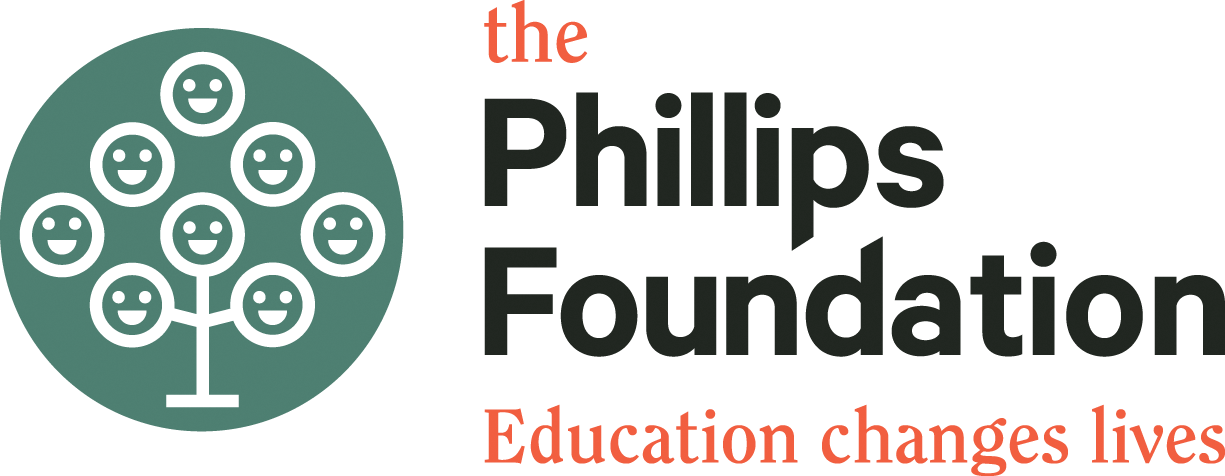
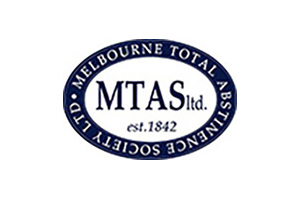


Does your club need funding?
Apply for funding now through your local Bendigo Bank
